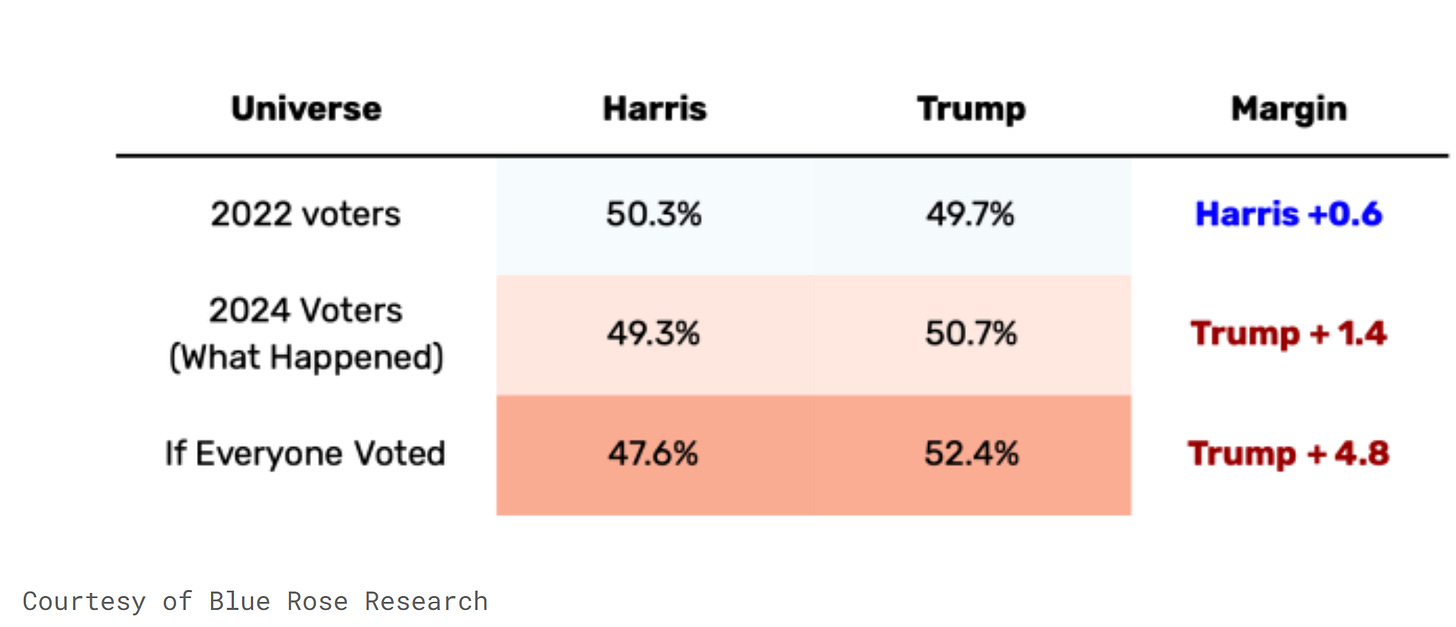The concept that Democrats have delusions about their current situation—that they are in denial about the implications of the 2024 election and other trends—is having a moment. No less a discourse arbiter than the Gray Lady has weighed in on the side that, yes, this is a thing. In an op-ed by the New York Times’ Editorial Board, the paper’s distinguished journalists lament:
In the aftermath of this comprehensive defeat [in the 2024 election], many party leaders have decided that they do not need to make significant changes to their policies or their message. They have instead settled on a convenient explanation for their plight.
That explanation starts with the notion that Democrats were merely the unlucky victims of postpandemic inflation and that their party is more popular than it seems: If Democrats could only communicate better, particularly on social media and podcasts, the party would be fine. “We’ve got the right message,” Ken Martin, the new chairman of the Democratic National Committee, said while campaigning for the job. “What we need to do is connect it back with the voters.
This is indeed delusional. The scale of the delusion is underscored by data just released by David Shor and Blue Rose Research (see also the interviews with Shor by Ezra Klein and Eric Levitz). How anyone can go through these findings and conclude anything other than that Democrats need a radical course correction is beyond me.
In that spirit, the Times’ Editorial Board and Shor do urge Democrats to cast off their delusions and offer some suggestions for such a course correction. I mostly agree with their suggestions—indeed, I’d urge the need for even stronger medicine. But I think it’s important to be clear-eyed about the various factors that will make it all too easy for Democrats to ignore or soft-pedal the need for a decisive reckoning with their “toxic brand.” Their delusions, it is likely, will prove quite difficult to get rid of.
Here's why.
1. The fool’s gold of Democrats’ low turnout advantage. The dirty little secret of Democrats’ current coalition is that it’s extremely well-engineered for low turnout elections. Democrats used to argue that they wanted really high turnout—ideally everyone voting—in elections because high voter participation is a civic good in democratic societies and because they believed that higher turnout would bring in masses of less engaged, pro-Democratic voters (younger, less educated, less affluent, nonwhite) that would benefit them politically.
No more. Now that the Democratic coalition is skewed toward the most educated, most engaged, high information voters, Democrats actually benefit when turnout is low and the voting pool is dominated by their highly engaged voters. Correspondingly, the more voters that show up, the worse it is for the Democrats. As a result, Democrats have become increasingly quiet about their commitment to high turnout and don’t talk much these days about the civic benefits of everyone voting. Maybe it’s not so bad if only the most interested citizens bother to vote!
You can’t blame Democrats from enjoying the electoral benefits of their current coalition. If they have a better chance of winning in relatively low turnout elections, they’ll gladly take it—and crow about their victories. But this presents a problem if Democrats do indeed need to get rid of their delusions and reform their party. Every time Democrats overperform in low turnout electoral contexts, that stiffens the spines of those who are resisting substantial change. Look at special elections X and Y, they’ll say, and how well Democrats did, vastly outrunning the underlying partisan lean of the state or district. There’s no need for big changes—we’re doing great!
You can see this dynamic playing out in the aftermath of last Tuesday’s special elections for a Wisconsin State Supreme Court seat and for filling House seats in Florida’s 1st and 6th congressional districts. Democrats did indeed overperform and the kvelling in Democratic circles was immediate and loud, especially about the victory of liberal Susan Crawford in the Wisconsin race by 10 points over her conservative opponent, preserving a 4-3 liberal majority on the court. That’s a good result for Democrats but it’s worth noting that last two Wisconsin State Supreme Court races in 2023 and 2020 were won by the liberal candidates with almost identical margins.
There may be less here than meets the eye. As Nate Cohn remarked on the day these elections were held:
Nothing about today’s results will change that the Democratic Party has major problems, from big-picture messaging and policy questions to its struggles among specific demographic groups, like young men and nonwhite voters.
But even if the results don’t do much about these major problems, it is likely to divert Democrats’ attention from doing anything about them. Indeed, they are likely to focus instead on how their overperformance in Tuesday’s and earlier specials augurs well for their quest to take back the House in 2026.
And that could be a further problem. David Shor pointed out in his interview with Ezra Klein:
If Democrats do nothing, they’ll probably be OK in 2026. All of these voters who get their news from TikTok, who don’t care about politics—voters under 25—just aren’t going to turn out in the midterms.
But if we don’t fix this problem, then four years from now, we could be facing the same trust deficit on all these core issues. And the voters who didn’t turn out in 2026 will come back — but this time, we might be running against a candidate who is a lot less unpopular than Trump. And that could be a real pickle.”
A pickle indeed. This table from Shor illustrates how the dynamic for Democrats changes in a high turnout environment.
That should concentrate the mind.
2. The comfort food of thermostatic reaction against the GOP. It was predictable that Trump and the GOP would go too far in some respects after he got re-elected. Parties these days do tend to over-read their “mandates” and Trump is, well, Trump and inclined to do things to excess. I think it’s safe to say that he has exceeded expectations in this respect. As a result, the thermostatic reaction is setting in, as voters seek to turn the policy thermostat down to a more comfortable setting.
They are not happy with the antics of Elon Musk, how far the cuts in government have gone and their haphazard nature, the lack of attention to lowering prices and the chaotic pursuit of a tariff regime that may raise prices as well as having other negative economic effects. Voters’ discontent is a boon to the Democrats of course and Democrats do not have to change their party much, if at all, to reap the benefits. This is another factor militating against Democrats’ willingness to jettison their delusions. After all if Trump is so terrible and is royally screwing things up, why go to the big trouble of confronting fundamental problems when simply being not-Trump should allow the party to connect to thermostatic reaction? It’s a tempting—and comfortable—strategy.
3. The siren call of economic determinism. It’s no secret that economic issues loomed large in the last election and that Democrats were disadvantaged by that. It’s fair to say that economic issues will continue to be central to the party’s fate in the future.
But economic issues are not the only issues. Cultural issues are also hugely important to voters’ views of a political party and how likely that party’s actions are to be consistent with their interests and values. It is not the case that economic factors and issues will necessarily determine voters’ political preferences if only the proper approach can be found. Cultural inclinations are not so easily overruled.
But in truth this is what most Democrats seem to believe. They are culture denialists. That is, they do not consider cultural issues real issues. They are typically viewed as politically motivated distractions or as expressions of something else entirely (i.e., racism, sexism, xenophobia, transphobia, etc.) They are not treated as issues that need to be dealt with on their own terms, with the corresponding need to potentially change party positions to accord with popular, particular working-class, preferences.
I see the hand of economic determinism in much of what Democrats have offered since the 2024 election. Bernie Sanders and AOC think Democrats should talk more about the “billionaire class” and “fighting oligarchy.” Ro Khanna proposes a “New Economic Patriotism” that would emphasize promotion of American manufacturing and hi-tech development across all regions of the country. Chris Murphy thinks the key to a Democratic revival is advocating the breakup of corporate power. Other Democrats suggest a relentless focus on “kitchen-table” issues (ah, what would Democrats do without that fabled kitchen table…). Even the new kid on the block, the “abundance” liberals, who have more interesting ideas, still leave cultural issues completely out of their framework. The general idea across these approaches is that focusing on economic issues will win back the working class and obviate the need to change anything else.
This attempt to magic away the influence of culture has not worked and will not work. To borrow a term from the Marxists, culture is not a part of the “superstructure” which is subservient to the “base.” Culture has a mind and dynamic of its own as Democrats should have learned by now, considering how much it’s hurt the party politically. But the siren call of economic determinism is powerful and remains a key obstacle preventing Democrats from casting off their delusions.
For all these reasons, it seems likely that Democratic delusions and, consequently, their “toxic brand” will be with us for quite some time. Those seeking to reform the party have their work cut out for them.







If you want to see the demise of the Democratic Party, look no further than the recent tour by AOC and Sanders and the Performance of Cory Booker.
None of these activities convinced a single voter to switch from Republican to Democrat, but Progressives went NUTS!!! over them. "Energizing the base!!!" "Thousands turned out!!!"
In not a single publication have we read about "Progressives" saying "We were wrong about..........We need to change our beliefs about what people want............" Instead, they say the same things they have been saying for years....which got us Trump twice.
It is why my wife and I, Democrats for 50 years, have recently switched to being Independents. The progressives who have infested the party don't want to win. Instead, they seek the warm inner glow of feeling morally superior and "right."
We miss our beloved Democratic Party.
It's been many years since most of us looked to the New York Times Editorial Board for wise counsel, but it scores big with its argument about many Democrats clinging to the delusion that the Party is merely the unlucky victim "of postpandemic inflation and that their party is more popular than it seems."
In fact, postpandemic inflation has actually been exceeded by the postpandemic propaganda and coverups that Democrats cling to, as if they are going to still convince Americans of what they have since learned beyond any reasonable doubt were orchestrated untruths about the origins of and safeguards against Covid.
Adding insult to injury, and compounding lack of trust in Democrats, has been their relentless embrace of what Ruy Teixeira identifies as their cultural issues' agenda -- transgender sports, open borders, DEI, etc. -- which most Americans, including most Democrats, have not and never will share the Party's obsession with. Cultural issues too often play loose not just with common sense, but constitutional principle.
The one thing today's Democratic Party may hate even more than Elon Musk, Donald Trump and Republicans in general is losing elections. It's going to take a few more stinging losses before Americans again enjoy the tangible benefits of a viable, civil and competitive two-party system.